Deborah Swift's Blog, page 8
December 13, 2023
The Fortune Teller of Kathmandu by Ann Bennett #India #Burma #CoffeePotBookClub #wartime
Hampshire, UK, 2015. When Chloe Harper’s beloved grandmother, Lena dies, a stranger hands her Lena’s wartime diary. Chloe sets out to uncover deep family secrets that Lena guarded to her grave.
Darjeeling, India, 1943. Lena Chatterjee leaves the confines of a strict boarding school to work as assistant to Lieutenant George Harper, an officer in the British Indian Army. She accompanies him to Nepal and deep into the Himalayas to recruit Gurkhas for the failing Burma Campaign. There, she discovers that Lieutenant Harper has a secret, which she vows never to reveal.
In Kathmandu, the prophesy of a mysterious fortune teller sets Lena on a dangerous course. She joins the Women’s Auxiliary Service Burma (the Wasbies), risking her life to follow the man she loves to the front line. What happens there changes the course of her life.
On her quest to uncover her grandmother’s hidden past, Chloe herself encounters mystery and romance. Helped by young Nepalese tour guide, Kiran Rai, she finds history repeating itself when she is swept up in events that spiral out of control…
Review
I thoroughly enjoyed this wartime story set in Kolkata, Darjeeling, Nepal and finally wartime Burma.
The main character Chloe is on the trail of her grandmother to find out more of her life, and we read Lena’s (the grandmother’s story) through extracts from her diary. These are skilfully woven into the book and help the reader to flow seamlessly from the past to the present. The unusual locations and Ann Bennett’s descriptions of India and Burma are definitely a highlight of the book. There are two main male characters in the book, Billy, who Lena first meets in hospital, and George Harper, an army officer. We know from the beginning of the book who Lena chooses to spend her life with, but why? And what happened to the other man?
The settings are beautifully done – this is an era and place that appealed to me because of my own family history, and Ann Bennett more than delivered on my expectations. It is not all romance, as this is the war with Japan — and the army camps, the fighting, bombings and the grim reality of civilian tragedies are all well portrayed, and with all the visceral tension you would expect. A book such as this takes mountains of research, and here the research is fed into the book without overwhelming the reader.
If you are looking for a wartime story with romance and an unusual location, then try this, it’s a great read.
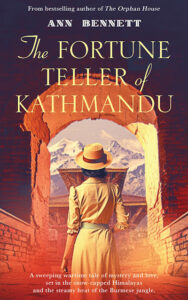 BUY THE BOOK
BUY THE BOOK
This title is available to read with #KindleUnlimited.
Universal Buy Link: https://mybook.to/tftok
About Ann Bennett
Ann Bennett is a British author of historical fiction. She was born in Pury End, a small village in Northamptonshire, UK and now lives in Surrey. Her first book, Bamboo Heart: A Daughter’s Quest, was inspired by researching her father’s experience as a prisoner of war on the Thai-Burma Railway. Bamboo Island: The Planter’s Wife, A Daughter’s Promise and Bamboo Road:The Homecoming, The Tea Panter’s Club and The Amulet are also about the war in South East Asia, which together with The Fortune Teller of Kathmandu make up the Echoes of Empire Collection.
Ann is also author of The Runaway Sisters, bestselling The Orphan House, The Forgotten Children and The Child Without a Home, published by Bookouture. The Lake Pavilion, The Lake Palace, both set in British India in the 1930s and WW2, and The Lake Pagoda and The Lake Villa, set in French Indochina during WW2, make up The Oriental Lake Collection.
Ann is married with three grown up sons and a granddaughter and works as a lawyer. For more details please visit https://www.annbennettauthor.com/
The post The Fortune Teller of Kathmandu by Ann Bennett #India #Burma #CoffeePotBookClub #wartime first appeared on Deborah Swift.November 26, 2023
Madame Pommery by Rebecca Rosenberg #Review #Champagne #HistoricalFiction #CoffeePotBookClub
Review of Madame Pommery by Rebecca Rosenberg
If you know nothing about how Champagne is made, or its history, then you can’t do better than to pick up this book. The painstaking and long process from choosing the right blend of grape to crushing and fermenting s described in intricate detail. Madame Pommery herself is a force of nature – a woman struggling in a man’s world, a woman who just won’t give up in her quest to convert the people to her new and drier taste of Champagne. Not content with retiring after her husband’s death Madame Pommery is determined to make a success of her husband’ Louis’ wine business, despite having to take care of her small children.
This is not as straightforward as it sounds, for just as she is about to launch her creation on the world, France is taken over by the Prussians and she must endure an occupation that ruins her fledgling business, and also puts all their lives at risk. The description of how it feels to be in this position is extremely well done – the powerlessness and rage. Later in the novel Madame Pommery discovers that the rubbish dump which covers the local lime pits, also covers miles of tunnels. These tunnels are ideal for storing her newly-minted wine. These cellars were the right temperature for storing her wine, and I believe many other wineries followed suit. Not only are the underground tunnels the answer to her storage problem, but also she uses them to house rebels and partisans. There is a gripping scene where they are discovered and the resisters are almost buried alive. Eventually she commissions a local sculptor to carve a frieze inside these cellars, the ‘Fete du Bacchus’, thus turning them into a sensational tourist attraction.
Throughout the novel, the characters are well-drawn, with several of Madame’s lovers and friends forming strong contrasts to her single-minded ambition. Her children too are true individuals, and even Felix the matagot – the pet that has a mind of its own. Rebecca Rosenberg has done immense amounts of research to bring the setting of 19th Century France alive with convincing amounts of detail. For those who love French history or the 19th Century this is very definitely a five star read and I recommend it without hesitation.
Thank you to the author and the Coffee Pot Book Club for this excellent book.
ABOUT MADAME POMMERY
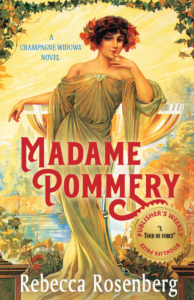 EDITORS CHOICE HISTORICAL NOVEL SOCIETY
EDITORS CHOICE HISTORICAL NOVEL SOCIETY
“A-Tour-de-Force” Publisher’s Weekly BookLife Prize
MADAME POMMERY, Creator of Brut Champagne
“A tour-de-force of historical fiction, Madame Pommery is a deeply fascinating work that blends true-to-life details with artfully crafted elements.” –Publishers Weekly BookLife Prize
Madame Pommery is a story of a woman’s indomitable spirit in the face of insurmountable odds. Set in Champagne, France in 1860, Madame Pommery is a forty-year-old widow and etiquette teacher whose husband has passed away. Now she must find a way to support her family. With no experience, she decides to make champagne, but no champagne makers will teach her their craft. Undeterred, Madame Pommery begins to secretly excavate champagne caves under the Reims city dump and faces numerous obstacles to achieve her dream. From the Franco-Prussian war that conscripts her son and crew to the Prussian General Frederick Franz occupying her home, Madame Pommery perseveres. She even must choose between her champagne dreams and a marriage proposal from her former lover, a Scottish Baron. Inspired by a true story, Madame Pommery is a heroic tale of a woman’s strength and determination to create a champagne legacy.
Available to read on #KindleUnlimited.
Champagne Widows Series Links:
Amazon UK: Amazon US: Amazon CA: Amazon AU:
Connect with Rebecca Rosenberg
Website: Facebook Amazon Author Page: Goodreads:
The post Madame Pommery by Rebecca Rosenberg #Review #Champagne #HistoricalFiction #CoffeePotBookClub first appeared on Deborah Swift.November 15, 2023
Spotlight on Twelve Nights by Penny Ingham #16thCentury #MurderMystery #CoffeePotBookClub
1592. The Theatre, London.
When a player is murdered, suspicion falls on the wardrobe mistress, Magdalen Bisset, because everyone knows poison is a woman’s weapon. The coroner is convinced of her guilt. The scandal-pamphlets demonize her.
Magdalen is innocent, although few are willing to help her prove it. Only handsome Matthew Hilliard offers his assistance, but dare she trust him when nothing about him rings true?
With just two weeks until the inquest, Magdalen ignores anonymous threats to ‘leave it be’, and delves into the dangerous underworld of a city seething with religious and racial tension. As time runs out, she must risk everything in her search for the true killer – for all other roads lead to the gallows.
READ A SNIPPET
Excerpt from Twelve Nights by Penny Ingham
John’s knees gave way and he crashed to the boards. The audience froze like a courtly tableau. The groundlings and the bum-cushions fell silent, not a single nut was cracked, nor an orange loudly sucked. Even the furtive fumblings and pleasurable moans on the back row ended abruptly. All eyes were on John’s collapsed form
Suddenly, everything was in motion again. The players were converging on John, arms outstretched as if their touch might somehow heal him. Magdalen was moving too, running from the ‘tiring house to the stage, pushing her way through the players to fall to her knees at John’s side. He was having difficulty breathing, gulping for air. And then he vomited on the boards, a putrid broth of half-digested meat.
His lips were swelling and tinged with blue. Horror-struck, Magdalen realised she had seen this before. This was not stage fright, nor sweating sickness, nor plague. This was poison, most likely aconite, although they had called it wolfsbane on the farm.
The players closed up, a brightly coloured fortress of doublets and cloaks, kirtles and gowns, protecting John from a thousand pairs of morbidly curious eyes. Through the players’ legs Magdalen could see the groundlings pressing forward for a closer look and heard those at the front cry out, afraid they might be crushed. In the galleries, the audience was on its feet, the hum of voices growing louder. They sounded shocked but at the same time exhilarated, and at that moment she hated them all.
John continued to heave until his stomach was empty, and then he coughed up bile, and finally he coughed up blood. Sapped of strength, he curled into a ball, clutching his belly. Magdalen lifted his head onto her lap and removed his wig. His cropped, black hair was clamped to his scalp with sweat, but his skin felt cold.
‘They’ve done me in.’ His tongue was swollen, too big for his mouth, and his words were difficult to decipher.
‘Who?’ Magdalen asked urgently. ‘Who did this to you?’
‘I should have listened…’ His hand searched for hers and his fingers unfurled. There was a piece of paper in his palm, folded repeatedly until it was no larger than a sovereign. ‘Take it.’
She did as he asked. The paper was damp with his sweat.
‘This is… your fault…’ he gasped, fighting for air.
What on earth did he mean by that? Had she heard him correctly? ‘John, why is it my fault?’
But he didn’t speak again. Magdalen held him for what seemed an eternity, her arms growing numb from bearing his weight, unchecked tears running down her cheeks. London had seen so much death these last few years, but she had never grown accustomed to it. It still had the power to fracture her heart. But it was not the plague that had taken John to God. It was poison.
She looked up at the throng of players. For all their rivalries, they were a tightly-knit family, a band of brothers. She had known these men since she was a child, and it was impossible to believe any of them were capable of murdering John. Perhaps she was in some way responsible for his death. She thought back over the last twenty-four hours. If she had paid more attention, could she have prevented this? Would John still be alive?
BUY THE BOOKAmazon UK • Amazon US • Amazon AU • Amazon CA
About Penny Ingham
 Penny has a degree in Classics, and a passion for archaeology – during the summer months, you will often find her on her a ‘dig’ with a trowel in her hand. She has had a variety of jobs over the years, including ice-cream seller, theatre PR, BBC local radio, and TV critic for a British Forces newspaper.She has written four novels – The King’s Daughter is the story of Aethelflaed, Lady of the Mercians. The Saxon Wolves and The Saxon Plague are set in the turbulent aftermath of Roman Britain. Her inspiration for Twelve Nights grew from her love of the theatre in general, and Shakespeare in particular.Penny has two grown up children and lives with her husband in Hampshire.
Penny has a degree in Classics, and a passion for archaeology – during the summer months, you will often find her on her a ‘dig’ with a trowel in her hand. She has had a variety of jobs over the years, including ice-cream seller, theatre PR, BBC local radio, and TV critic for a British Forces newspaper.She has written four novels – The King’s Daughter is the story of Aethelflaed, Lady of the Mercians. The Saxon Wolves and The Saxon Plague are set in the turbulent aftermath of Roman Britain. Her inspiration for Twelve Nights grew from her love of the theatre in general, and Shakespeare in particular.Penny has two grown up children and lives with her husband in Hampshire.
Author Links:
November 13, 2023
Anthologies in 2023 with contributions by Deborah Swift @swiftstory #Anthology #HistoricalFiction #WW2 #Touch
 ACTION THIS DAY I’ve been lucky enough to be invited to contribute to several anthologies over this year, so I thought I’d highlight them in a post. My story The Secret Listener is based on true events in WW2, where young men who were expert radio buffs were recruited to track and record suspect transmissions from within Britain – hoping to track down German spies. When seventeen-year-old radio fan Jim Bedford agrees to work as a Voluntary Interceptor, to track down Nazi spies, his girlfriend Shirley fears he is up to no good.
ACTION THIS DAY I’ve been lucky enough to be invited to contribute to several anthologies over this year, so I thought I’d highlight them in a post. My story The Secret Listener is based on true events in WW2, where young men who were expert radio buffs were recruited to track and record suspect transmissions from within Britain – hoping to track down German spies. When seventeen-year-old radio fan Jim Bedford agrees to work as a Voluntary Interceptor, to track down Nazi spies, his girlfriend Shirley fears he is up to no good.
This story also appears in a second anthology also published by Aspects of History.
This selection of stories can be read on Kindle Unlimited, and I highly recommend them all.
BUY THE BOOK
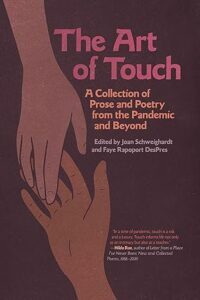 Also this year, after a long wait, The Art of Touch: Prose and Poetry from the Pandemic and Beyond has been released. In this anthology I contributed an article about touch in both the physical and emotional sense. In The Art of Touch: Prose and Poetry from the Pandemic and Beyond, the unique voices of thirty-nine of some of the most creative thinkers of our times have been brought together to consider the profound impact of one of our five main senses: touch.
Also this year, after a long wait, The Art of Touch: Prose and Poetry from the Pandemic and Beyond has been released. In this anthology I contributed an article about touch in both the physical and emotional sense. In The Art of Touch: Prose and Poetry from the Pandemic and Beyond, the unique voices of thirty-nine of some of the most creative thinkers of our times have been brought together to consider the profound impact of one of our five main senses: touch.
Psychologists, healers, massage therapists, academics, creative writers, and others reflect on or tell personal stories about what it means to be able to touch or experience touch, or to have to go without it—as so many did and still do because of the COVID-19 pandemic. They explore how transmissions such as texting may impede opportunities for touch, while those like Zoom may make it possible for people who otherwise might be left behind to stay “in touch.” From the experience of touching beloved animals to the life-changing ways in which books and performances can touch us, virtually all aspects of touch are acknowledged in these pages.
Thirdly, I was invited to read, and then write an introduction to a compilation of historical stories based around the theme of Exile. The stories in this selection are all well-written and interesting and I recommend the stories, quite apart from my introduction, which you can read here.
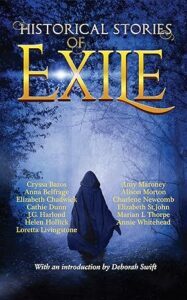 HISTORICAL STORIES of EXILE by (in order of appearance)
HISTORICAL STORIES of EXILE by (in order of appearance)
Annie Whitehead, J.G. Harlond, Helen Hollick, Anna Belfrage, Elizabeth Chadwick, Loretta Livingstone, Elizabeth St.John, Alison Morton, Charlene Newcomb, Marian L Thorpe, Amy Maroney, Cathie Dunn and Cryssa Bazos
With an introduction by Deborah Swift.
Exile: a risky defiance, a perilous journey, a family’s tragic choice – or an individual’s final gamble to live. Exile: voluntary or enforced, a falling-out between friends, a lost first love, a prejudiced betrayal – or the only way to survive persecution?
In this historical fiction anthology thirteen authors (they are not superstitious!) have written exclusive short stories on the theme of exile. Some are based on true history, others are speculative fiction. All mine the depths of human emotions: fear, hope, love, and the fortitude to survive.
Join an inspiring Anglo-Saxon queen of Wales, a courageous Norwegian falconer, and a family fleeing back in time to escape the prospect of a ruthless future. Oppose the law with the legendary Doones of Exmoor, or defy the odds with two brave WWII exiles. Meet a Roman apprehensively planning exile to preserve the ‘old ways’, and a real Swedish prince forcibly expelled in heart-wrenching circumstances. Thrill to a story based on the legend of Robin Hood, sail with a queen of Cyprus determined to regain her rightful throne; escape religious persecution, discover the heart-rending truth behind the settlement of Massachusetts and experience the early years that would, eventually, lead to the founding of Normandy. Experience the stirring of first love, and as an exclusive treat special guest author, Elizabeth Chadwick, reveals a tale about the 12th-century’s heiress, Isabelle de Clare, and the Greatest Knight of all time – William Marshal.
With an introduction by multi-award-winning author Deborah Swift, enjoy these tales of exile across the ages. Some are hopeful, some sad, some romantic, some tragic, but all explore the indomitable spirit of resolute, unforgettable characters.
“Each [story] conjures up the times and characters excellently, and they are often glimpses into the authors’ other works. If you, like me, were drawn to this by a favourite name you will finish it with several more, and a much longer To Be Read List.” Reader’s Review (ARC edition)
BUY THE BOOKThe post Anthologies in 2023 with contributions by Deborah Swift @swiftstory #Anthology #HistoricalFiction #WW2 #Touch first appeared on Deborah Swift.Spotlight on House Aretoli by K M Butler #Venice #Medieval #HistoricalFiction #NewRelease
HOUSE ARETOLI
A new release in Medieval historical fiction set in Italy
1365, Venice, Italy. For generations, the merchants of House Aretoli have profited through faithful service to the Republic of Venice. Despite being only a minor senatorial family, they’ve established a reputation for reliability, fidelity, and ingenuity.
But the Aretoli are about to face the ultimate test. Caught up in a rebellion on Venice’s territory of Crete, young Niccolo Aretoli returns as a hero after saving the governor’s life and evacuating the loyal citizenry. Yet despite his new fame, not all is well in Venice. Niccolo’s beloved has been forced into marriage to safeguard her family from ruin. Fresh jealousies divide him from his brother Flavio. And traitorous senators and a seductive foreign agent threaten to divide and destroy his family as part of an even darker design.
From brothel to Senate, on land and sea, through marriage and loss, the sons and daughters of House Aretoli struggle against spies, treachery, and assassination. The seeds of discord are already growing, and they threaten to turn sibling against sibling.
Chased on land and sea by enemies and betrayed by his closest allies, Niccolo must overcome a conspiracy that threatens his survival, the lives of his family, and the very existence of the republic itself.
BUY THE BOOKMore about Kevin:
K.M. Butler studied literature at Carnegie Mellon University and has always had an avid interest in history. His writing influences are “The Lions of al-Rassan” by Guy Gavriel Kay and Colleen McCullough’s “Masters of Rome” series. He lives in Philadelphia with his wife and two daughters. His wife is his first and harshest editor, while his daughters always want his stories to feature more blood and talking animals, but never at the same time.
Contact K.M. Butler at kmbutlerauthor@yahoo.com or on Twitter at @kmbutlerauthor.
Also by KM Butler
House Aretoli: A novel of medieval Venice
The Welsh Dragon: A novel of Henry Tudor
The Raven and the Dove: A novel of Viking Normandy
The post Spotlight on House Aretoli by K M Butler #Venice #Medieval #HistoricalFiction #NewRelease first appeared on Deborah Swift.November 7, 2023
The Familists by VEH Masters #16thCentury #Conversos #Castilians #Reformation
Vicki Masters is on my blog today to tell us about her series set in the Reformation and Counter-Reformation, and her new book The Familists.
1. The Familists is your fourth book in The Seton Chronicles. Tell us about the story so far.
I wrote the first book, The Castilians, about the 1546 siege in the castle of my home town, St Andrews in Scotland. The story centres around Bethia and Will who are caught up on opposite sides of the siege. When I reached the end readers wanted to know what happened next and I became curious too. The Conversos – who were Jews who were forcibly converted – is set in Antwerp and also explores the grim reality of life on the galleys. As one reader said in a Goodreads review, ‘…I will never forget the horrors of being a galley slave’, which was great feedback.
The Conversos – who were Jews who were forcibly converted – is set in Antwerp and also explores the grim reality of life on the galleys. As one reader said in a Goodreads review, ‘…I will never forget the horrors of being a galley slave’, which was great feedback. The books are set during the Reformation and Counter Reformation and inevitably shifts in religion form a strong theme. Will is a Protestant, Bethia a Catholic and her husband a Converso. For instance in the third in series, The Apostates, the family find themselves in Catholic Venice where Jews can live openly (unlike Antwerp) and wealthy Conversos are welcomed but where it’s definitely not safe to be Protestant. The whole series focuses on whether the strength of family loyalty can overcome all, regardless of faith.
The books are set during the Reformation and Counter Reformation and inevitably shifts in religion form a strong theme. Will is a Protestant, Bethia a Catholic and her husband a Converso. For instance in the third in series, The Apostates, the family find themselves in Catholic Venice where Jews can live openly (unlike Antwerp) and wealthy Conversos are welcomed but where it’s definitely not safe to be Protestant. The whole series focuses on whether the strength of family loyalty can overcome all, regardless of faith.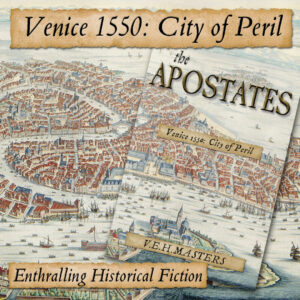 2. Familists is an unusual word. Where did the title come from and what’s its significance?
2. Familists is an unusual word. Where did the title come from and what’s its significance?
Familists, also known as the Family of Love, were a group influenced by the teachings of Henrik Niclaes in the 1550s. They prioritised a deep spiritual connection with God, considered religious rituals an unnecessary distraction (be they Catholic, Protestant, Jewish or Moslem) and emphasised the significance of harmony. Niclaes taught that members of the group could overtly follow any religion because what truly mattered was the strength of family, including the servants, as a fellowship of peace coming together to make a connection with God through conversation, sharing and debate. One of my characters meets Niclaes at the Frankfurt Book Fair (which remarkably has been held since the 1100s) and sees Familism as a way for his family of differing faiths to unite around a common bond – although it turns out not to be quite so straightforward in a world riven by the Reformation.
One of my characters meets Niclaes at the Frankfurt Book Fair (which remarkably has been held since the 1100s) and sees Familism as a way for his family of differing faiths to unite around a common bond – although it turns out not to be quite so straightforward in a world riven by the Reformation.
3. The Familists is partly set in Constantinople. How did that come about?
Conversos were fleeing there in increasing numbers by the mid 1500s. Venice was no longer a safe haven as a new Pope came to power who hated them with a passion, was intent on seizing all they owned and ramped up the Inquisition. Both Jews and Christians could live in Istanbul without fear of religious persecution. They weren’t treated as equals but some ended up in very powerful positions as advisers to the sultan and physicians in his court. Most famously Don Joseph Nasi, who Marlowe is said to have based his play The Jew of Malta on. He appears in both The Apostates and The Familists. Of even greater interest to me was his aunt Dona Gracia who helped countless Conversos flee from Portugal and Antwerp.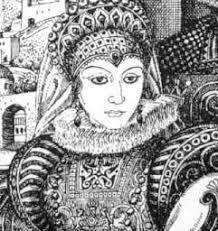 I hadn’t realised until I wrote this book how interlinked politics and trading within Europe was with the Ottoman Empire. It was absolutely fascinating and of course gave me the perfect excuse to visit Istanbul.
I hadn’t realised until I wrote this book how interlinked politics and trading within Europe was with the Ottoman Empire. It was absolutely fascinating and of course gave me the perfect excuse to visit Istanbul. 4. What are you working on now?
4. What are you working on now?
The final book in the series. It’s set in Scotland so my characters will come full circle back to their homeland. I’m looking forward to researching life in Scotland of 1586 and the resources are all on my doorstep which will make it a lot easier. It’s due out a year from now.
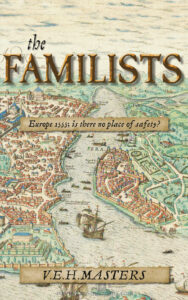
Italy 1555.
Bethia and her growing family find themselves in the midst of the Inquisition’s vicious attack on Jews and Conversos. Despite Bethia’s commitment to her Catholic faith, her greater loyalty to her Converso husband forces them to flee onwards to Constantinople – but will it be any safer? For Will, Bethia’s brother, it’s equally perilous to be a Protestant. Caught up in France’s religious turmoil, where many are burned for their faith, his choice is stark; fight or accept a martyr’s death. Set amid the treacherous landscape of Reformation Europe, where faiths divide and shifting allegiances dictate survival, can the strength of family endure?
BUY THE BOOK Click Here to Buy in US Canada Australia UK
Praise for The Familists
‘A worthy continuation of the Seton Chronicles, packed with personal, political and religious tension and intrigue’ Margaret Skea, award winning author.
‘having followed this intimate and remarkable story so closely it’s impossible not to feel like one of the family.’ Esther Mendelssohn
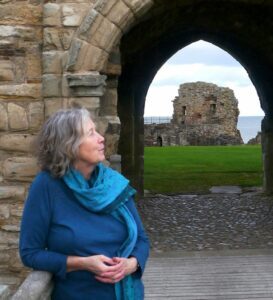
V.E.H. (Vicki) Masters writes historical fiction set in the 1500s. Her books are regularly on the Amazon Bestseller List, and she is the winner of the Barbara Hammond Trophy. She has a BA in History and Sociology and an MSc with distinction. For many years she worked in the NHS as an organisational development manager and latterly ran her own business as an executive coach and team development specialist. Now she writes full time which, when it’s
going well, she loves. You’ll find a couple of free short stories which tells more of the era.
https://www.instagram.com/vehmastersbooks/
The post The Familists by VEH Masters #16thCentury #Conversos #Castilians #Reformation first appeared on Deborah Swift.
November 3, 2023
Spotlight on The Matchstick Boy by Rowena Kinread #Switzerland #19thCentury #TrueCrime
This new novel takes place in a remote Swiss valley in the mid-19th century. It is based on a true story.
The Matchstick Boy: Jakob, a simple farmer, is determined to gain justice for his daughter, against the odds.
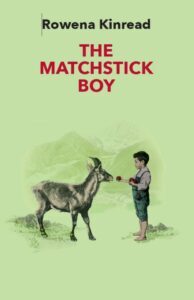 When his young brother, Josef, is killed by a rock avalanche, Jakob believes it is murder. He had seen someone on the mountain ridge, above the scree, before it began to roll. But who would want to kill a child, and why? Jakob suspects Ramun, the privileged son of the owner of a matchstick factory, but nobody takes him seriously and he is powerless to obtain justice.
When his young brother, Josef, is killed by a rock avalanche, Jakob believes it is murder. He had seen someone on the mountain ridge, above the scree, before it began to roll. But who would want to kill a child, and why? Jakob suspects Ramun, the privileged son of the owner of a matchstick factory, but nobody takes him seriously and he is powerless to obtain justice.
Thirty years later, Jakob’s profoundly deaf daughter is abused by Ramun and becomes with child. Determined to gain justice for his daughter, Jakob unearths a myriad of well-kept secrets in the tight-lipped community, but is anyone willing to tell the truth?
Just as he thinks he has uncovered all the facts, he realises he has made a vital mistake all along. Nothing is really as it seems.
BUY THE BOOK paperback and ebook on Amazon.
Soon to be published in German as “Der Zündhölzli Bub”
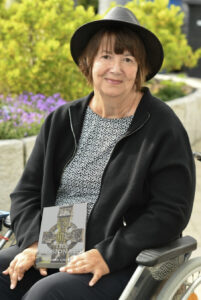 About Rowena
About Rowena
Rowena’s special area of interest is history. After researching her ancestry and finding family roots in Ireland with the Dalriada clan, she embarked on writing a series of novels set in early Ireland and Scotland.. Her debut novel titled “The Missionary” is a historical novel about the dramatic life of St. Patrick. It was published by Vanguard Press in 2021, and has been highly appraised by The Scotsman, The Yorkshire Post and the Irish Times.
Her second novel “The Scots of Dalriada” centres around Fergus Mór, the founder father of Scotland and takes place in 5th century Ireland and Scotland.
Although brought up in Yorkshire, Rowena lives with her husband, Franz, in Bodman-Ludwigshafen, Lake Constance, Germany. Find Rowena on her website https://www.rowena-kinread.com/
Lead picture is of the real family featured in the book.
The post Spotlight on The Matchstick Boy by Rowena Kinread #Switzerland #19thCentury #TrueCrime first appeared on Deborah Swift.October 24, 2023
Times of Turmoil by Anna Belfrage #Interview #TimeTravel #HistoricalFiction #CoffeePotBookClub
 Times of Turmoil is out now, and It’s lovely to host Anna Belfrage on my blog today to reveal some fascinating details about her time-travelling characters and history.
Times of Turmoil is out now, and It’s lovely to host Anna Belfrage on my blog today to reveal some fascinating details about her time-travelling characters and history.
Erin Barnes sounds like a person who needs to stand up for herself. What is it about her background that enables her to do this, and does Duncan her husband understand what drives her?
I think it helps that Erin (now Melville 😉) comes from the 21st century. She was raised in an environment where she was expected to stand up for herself, no matter that she is a person of colour. She also has Duncan’s full support. Well, okay, he would prefer it if she cultivated a lower profile at times, but God help the man—or woman—who disparages his wife!
Armand Joseph Chardon and his sons seem to be the main antagonists in the story. What is it about him and his family that makes him a bigger danger than any of the other dangers the couple face?
The Chardons have a secret weapon. I’m not about to reveal more than that, but let’s just say that Monsieur Chardon has repeatedly proven to what lengths he will go to rid himself of perceived enemies, and that weapon he has can, effectively, destroy Erin’s and Duncan’s life. Completely.
You have published several series of books. Can you say a few words about each series? Do you plan them all in advance, and if not how do you know when a series is finished?
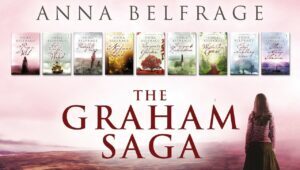
I never set out to write a series. I always set out with the ambition that this book, this one, will be a stand-alone. And then things happen, my characters develop into larger-than-life personas who desperately want to know what happens to them afterwards—as do I—and a new series is born.
My first series, The Graham Saga, is the story of time traveller Alex Lind and her 17th century hubby, Matthew Graham. Their life is exceedingly exciting at times with adventures both in Scotland but predominantly in the Colony of Maryland. Alex and Matthew are Duncan’s grandparents.
My second series, The King’s Greatest Enemy, is set in the 1320s and is the story of Adam de Guirande and his wife, Kit, who find themselves entangled in the political mess featuring Edward II, Roger Mortimer, Queen Isabella and a very young Edward III.
My ongoing medieval series, The Castilian Saga, is set in the times of Edward I against the background of his conquest of Wales. One little baby boy somehow slips through Edward’s attempts to rid the world of the Princes of Gwynedd, and that child ends up with my protagonists, Noor and Robert.
Other than my historical series, I’ve also published a contemporary paranormal/dark romance series called The Wanderer. Great fun to write!
And now, of course, I also have The Time Locket, with Times of Turmoil being the second instalment. There will deffo be a third (“And a fourth!” Erin yells. “No way will you leave us in the back of beyond without sorting out that mess.” Umm . . .)
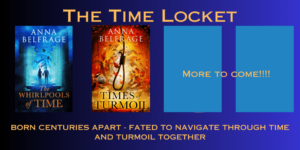
You have indie published all your books. What sort of a community have you built to enable you to do this, or do you do everything yourself?
I have a great editor – every writer needs an editor! I have a great cover artist. Other than that, I do everything myself – but I also have a cheerleading team consisting of other indie writers who are there to boost my ego when so required. Because—as you well know—there are moments when being indie is being very alone.
What book / film have you read / seen that gave you a similar feeling or atmosphere to Times of Turmoil.
What a difficult question! Some of the angst in Pirate Code by Helen Hollick is deffo present in Times of Turmoil. I also suspect I may have drawn some inspiration from Belle, the movie about Dido Elizabeth Lindsay, illegitimate daughter of an English nobleman and his coloured mistress.
Thank you Anna and all the best with your new series.
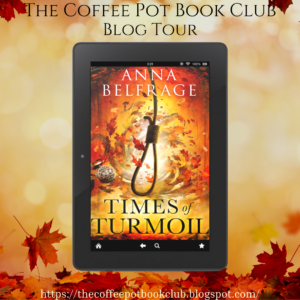
BUY THE BOOK
This title is available to read on #KindleUnlimited.
Amazon UK • Amazon US • Amazon AU • Amazon CA
Find out more about Anna, her books and enjoy her eclectic historical blog on her website, www.annabelfrage.com.Website • Twitter • Facebook • InstagramAmazon Author Page • BookBub • GoodreadsThe post Times of Turmoil by Anna Belfrage #Interview #TimeTravel #HistoricalFiction #CoffeePotBookClub first appeared on Deborah Swift.October 21, 2023
The Fifty Lost Christmases of Dolly Hunter by Jo Priestley #Yorkshire #Christmas #HistoricalFiction
Being brought up in Yorkshire myself, I’m thrilled to introduce you to Jo Priestley and her Women of Old Yorkshire series. Over to Jo:
 As the title of the series suggests, old Yorkshire is the setting for all my six historical fiction books from the Victorian era onwards. The Fifty Lost Christmases of Dolly Hunter is set later, from the 1970s to the present day, and it’s more the ‘real’ Yorkshire than perhaps the picturesque villages we’re known for. Dolly’s tale is set in a fictional town called Wakeley in West Yorkshire which was once the pinnacle of the north, but the town is now failing daily.
As the title of the series suggests, old Yorkshire is the setting for all my six historical fiction books from the Victorian era onwards. The Fifty Lost Christmases of Dolly Hunter is set later, from the 1970s to the present day, and it’s more the ‘real’ Yorkshire than perhaps the picturesque villages we’re known for. Dolly’s tale is set in a fictional town called Wakeley in West Yorkshire which was once the pinnacle of the north, but the town is now failing daily.
The main reason for the setting is familiarity; the houses, the people, even the smells of a place you know well can allow us the opportunity to bring it to vivid life. For instance, my favourite smell is a burning coal fire and I remember the scent greeting me on my way home as a child when row upon row of houses belched smoke into the sky. What a sight and smell it was to behold and how I miss it.
I waited four years after writing this book to publish as it’s fifty years this year since my town suffered the tragedy of an industrial accident. I was only five at the time, but the after-effects reverberated around us for years to come, and it put us on the map for the wrong reasons. I wanted to write about the strength and character of the people of that time, but also the incredible kindness and solidarity they showed one another. The ‘stranger’ Harriet who comes to the town with her young daughter in tow to try and help is from the outskirts of Leeds and the house is based on the one where my grandmother lived for nearly forty years. It was a beautiful testament to Victorian architecture before it was only recently demolished, and I admit to shedding a tear or two.

I think there’s also beauty to be seen in humble houses that are cherished and Dolly’s home is a “diamond twinkling amongst a stack of coal” as the town she’s lived in all her life is literally crumbling around her. Yet home is home whether conventionally beautiful or otherwise, and we know it’s the feeling it gives us more than anything else.
I wanted to write a Christmas tale that has a sprinkling of grit and a dash of darkness for good measure as I describe it. The town is struggling, and opportunities are being lost for the people day by day. The copper works, which had been the lynchpin of Wakeley, relocated in the 1990s in order to survive but the townsfolk were too stubborn and set in their ways to grasp what was there for the taking because they felt betrayed. They now live each day regretting the decision. It’s been a slow decay, so people barely notice how difficult life has become because they’ve grown used to it. It takes someone to roll in from out of town to point out the harsh realities of the situation.

Then there’s the Victorian tin church in the nearby woodland which is part of the book. I came across a ‘flatpack’ church which was intended to be temporary, but somehow stayed the course. Dolly tends the local church with Ralph who lives on the same row, and they went to school together. I liked the idea of a snowy woodland church at Christmastime. There’s plenty of the cosiness of Christmas to be found albeit in a more unusual setting. Dolly’s tale is a study of place as much as human nature and for me a Yorkshire Christmas with Yorkshire people is all I’ve ever known … I’d love to be able to share the magic with you.
BUY THE BOOKAbout Jo Priestley
Jo is a Yorkshire author committed to writing historical fiction based on real livesand real people. She grew up with tales by the fireside poignantly told by her grandmother in her crumbling but grand house on the outskirts of Leeds, creating the perfect atmosphere. Jo has been a professional business writer all her career, and now she would like to share the fictional stories that have been waiting in the wings until the time was right. She is a proud member of the Society of Authors.
After eight years of writing, six novels have been published in 2023 and she’s recently made a start on her seventh. The books are of women who all have their own individual tale of love, life and friendship to tell, and are set in and around Bronte Country. Jo considers the raising of five strong, kind-hearted daughters to adulthood her greatest achievement. Now she would like to commit herself in much the same vein to her passion for storytelling.
Find Jo:
TikTok Username: @women_of_old_yorkshire
Website Link: https://womenofoldyorkshire.com/
October 16, 2023
SALT OF THE EARTH by JJ Marsh #iodine #history #historicalfiction #medicine
I’m delighted to host JJ Marsh on my blog today to tell us about her new novel, SALT of the EARTH.
SALT OF THE EARTH is a historical fiction novel set in the early 1900s.
Overshadowed by world events such as the Great War and Russian Revolution, a quiet transformation took place which changed millions of past and present lives.
THE TRUE STORY
Tourists and climbers flocked to Switzerland during the ‘Golden Age of Alpinism’ in the late 19th century. The aim was to capture those towering peaks, whether by climbing, on canvas or in elegant prose. Another local feature drew crowds, but more as freak show than natural phenomenon: the mountain folk.
Brain fog, deafness and goitres, visible as huge swollen throats, had plagued Alpine valleys for centuries. Cretinism (then an official medical condition) was common. So much so that in Hergé’s Adventures of Tintin, Captain Haddock hurls an insult, calling someone a ‘crétin des Alpes’. Scholars and scientists assumed the fault lay with the people, blaming poor hygiene, unhealthy water or even inter-breeding. Until three Swiss country doctors made it their mission to cure the ‘blight of the Alps’. In 1915, Dr Heinrich Hunziker proposed a theory. The problem was not with the people but the earth. Glacial shifts over centuries had removed several strata of soil, and with it, iodine, an element essential for a healthy thyroid.
With scientific rigour and determination over three years, Dr Otto Bayard treated several remote villages with small doses of iodine-treated salt. His astonishing
results proved the deficiency theory beyond doubt. The final step was direct democracy in action. Dr Hans Eggenberger convinced people to act in their own interests. In 1922, the citizens of Appenzell Ausserrhoden Canton approved iodine fortification of table salt. The rest of the country soon followed. Within eight years, the malaise affecting many cantons lifted forever. When author JJ Marsh first read about this historical detail of her adopted country, she was stunned. “I couldn’t believe I’d never heard about it. Three men altered Swiss history, yet 100 years later, their names are practically forgotten. Despite knowing little about medicine, I knew it was an incredible story and had to tell the tale.”
THE RESEARCH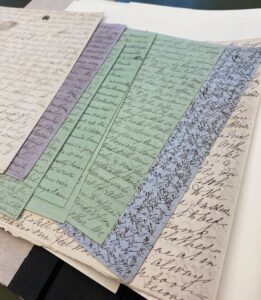
But digging into the past wasn’t always easy. “Documents of that time were hand-written, often in archaic German or French and often further complicated by the habit of cross-hatching. This is where one finishes writing from top to bottom, turns the paper to the right and continues writing horizontally across the existing text. People did this to save on paper and postage.” “My most startling finding was that iodine deficiency is not a thing of the past. Plant- based diets and reduction of dairy intake mean we’re consuming the absolute minimum. My loveliest discovery was that the thyroid is often called also called ‘the butterfly in the throat’. Hence the cover.”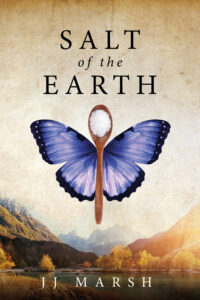
PRAISE FOR SALT of the EARTH
“Meticulously researched and beautifully written, this fascinating novel tells the little-known story of a life-changing medical breakthrough in the tumultuous times of WWI.” – Clare Flynn, author of The Pearl of Penang
“A powerful and heart-breaking tale of a cure for one of history;s most devastating ailments.” – Liza Perrat, author of The Bone Angel trilogy
BUY THE BOOK https://geni.us/AMZ_Salt_of_the_Earth

About the author:
Jill grew up in Wales, Africa and the Middle East, where her curiosity for culture took root. After graduating in English Literature and Theatre Studies, she worked as an actor, teacher, writer, director, editor, journalist and cultural trainer all over Europe. Now settled in Switzerland, she writes historical fiction.



